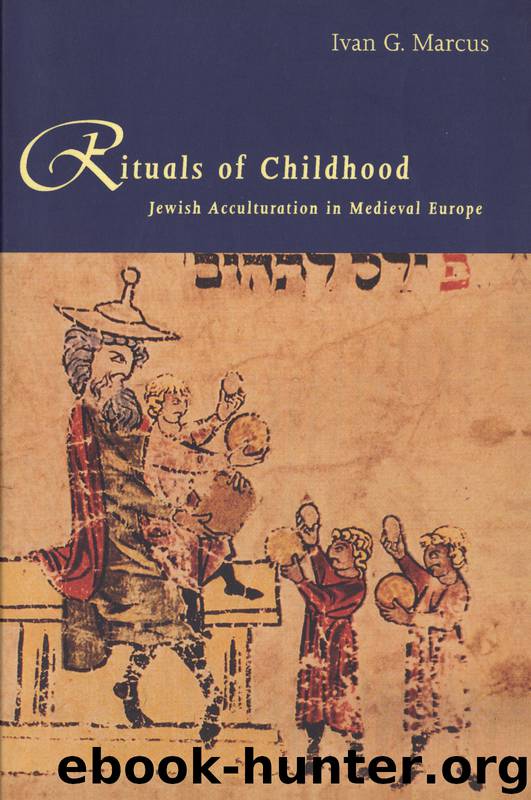Rituals of Childhood by Ivan G. Marcus

Author:Ivan G. Marcus
Language: eng
Format: epub
Publisher: Yale University Press
Published: 1996-03-14T16:00:00+00:00
Second Initiations: Delayed Confirmation-Eucharist and Jewish School Initiation
In the Christian tradition, the new emphasis on infant baptism presented a further problem. In the East, a bishop performed the rite of confirmation together with first communion, immediately after adult baptism. But as adult baptism was replaced by infant baptism, confirmation often had to be delayed. In the less densely populated areas of Europe, it was also more difficult to find a bishop than it had been in the East. As the culminating ceremony of confirmation became more problematic, it was deferred, and by the thirteenth century it was administered close to the age of seven, at least in parts of the West. This delay was advocated by theologians and canonists who were part of the cultural transformation that emphasized the interior life of the mind and spirit and who taught that the child should not be given communion before the age of awareness and consent.18
Although we will see that other factors were at work as well, the Christian association of school-age children with first communion played a role in shaping the Jewish child’s school initiation. There are striking formal similarities between communion and the Jewish school initiation rite introduced in the late twelfth century. Both took place when the child was of school age—at seven for Christians, at five, six, or seven for Jews. Both were administered by a figure embodying religious authority, either a bishop or a Torah teacher. Both were administered in the spring: the Christian ceremony at Easter or Pentecost 19 and the German-Jewish one at Shavuot (Pentecost). And both required that the child ingest symbolic foods among which a special kind of ritually sanctified cake or bread had a prominent place.
To be sure, they were not the same ceremony. In the late twelfth-century Jewish initiation, the child who studies Torah is understood as a sacrifice; the eucharist is a sacrifice of Jesus understood as a child. The eucharist is a remembrance of Jesus’ words at the Last Supper and is a Passover meal, but it also presents Jesus as the paschal sacrifice which the faithful must eat. Christians commune with God by eating his body in the form of a leavened cake, as is still done in the Eastern churches, or an unleavened wafer, as has been the practice in the West since the ninth century. Did the Jewish custom, based on eating a cake, like the Christian Syriac school initiation rite, preserve the Eastern Christian eucharistic rite long after it had disappeared in the West?
The faithful who consume the bread that has become the body of Christ must be in a state of religious purity. The child as sacrifice in the Jewish initiation also is first to be ritually pure. Although the theological meanings of the eucharist developed in stages, its public observance reached new heights in the late twelfth and early thirteenth centuries, just when the Jewish initiation rite appeared. In 1215 the Fourth Lateran Council included a canon which stated that every Christian adult must take communion annually, usually at Easter.
Download
This site does not store any files on its server. We only index and link to content provided by other sites. Please contact the content providers to delete copyright contents if any and email us, we'll remove relevant links or contents immediately.
| Haggadah | Hasidism |
| History | Holidays |
| Jewish Life | Kabbalah & Mysticism |
| Law | Movements |
| Prayerbooks | Sacred Writings |
| Sermons | Theology |
| Women & Judaism |
The Power of Habit by Charles Duhigg(3141)
Man's Search for Meaning by Viktor E. Frankl(2674)
Mckeown, Greg - Essentialism: The Disciplined Pursuit of Less by Mckeown Greg(2443)
MOSES THE EGYPTIAN by Jan Assmann(2417)
Devil, The by Almond Philip C(2333)
The Complete Dead Sea Scrolls in English (7th Edition) (Penguin Classics) by Geza Vermes(2283)
Unbound by Arlene Stein(2277)
I Capture the Castle by Dodie Smith(2040)
Schindler's Ark by Thomas Keneally(1890)
The Invisible Wall by Harry Bernstein(1808)
The Gnostic Gospel of St. Thomas by Tau Malachi(1799)
The Bible Doesn't Say That by Dr. Joel M. Hoffman(1682)
The Secret Doctrine of the Kabbalah by Leonora Leet(1612)
Political Theology by Carl Schmitt(1587)
The Jewish State by Theodor Herzl(1536)
A History of the Jews by Max I. Dimont(1533)
The Dead Sea Scrolls Bible by Martin G. Abegg(1520)
The Book of Separation by Tova Mirvis(1492)
Oy!: The Ultimate Book of Jewish Jokes by David Minkoff(1375)
